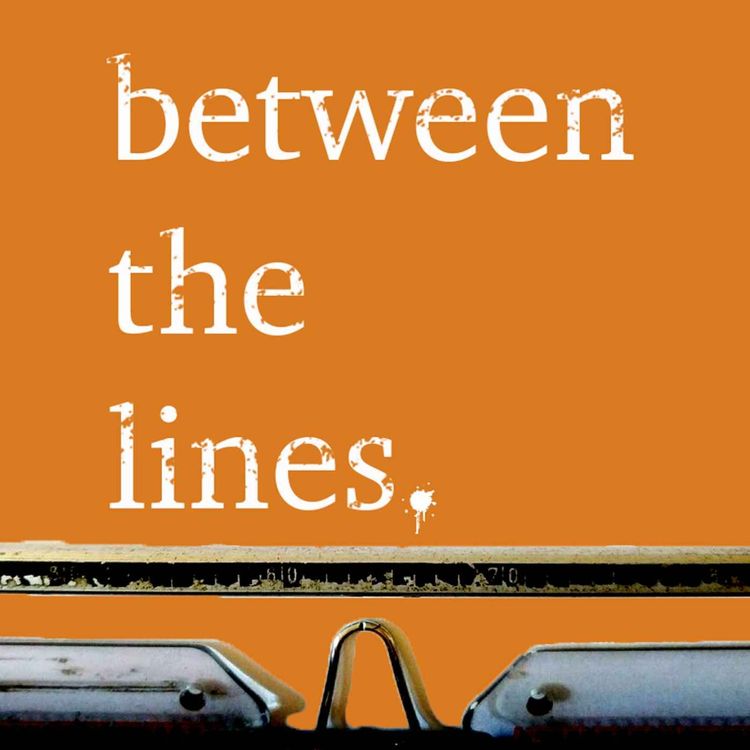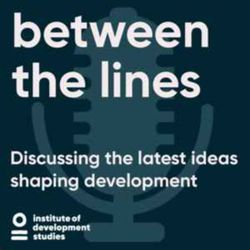Share

Between the Lines
The SAGE Handbook of Participatory Research and Inquiry
In this episode of Between the Lines, IDS Director of Research, Peter Taylor interviews IDS Research Fellows; Danny Burns and Jo Howard, and Sonia M. Ospina, Professor of Public Management and Policy at the NYU Wagner Graduate School of Public Service who edited the recently published: SAGE Handbook of Participatory Research and Inquiry.
The Handbook presents contemporary, cutting-edge approaches to participatory research and inquiry with contributions from 137 authors in 71 chapters. It has been designed for the community of researchers, professionals and activists engaged in interventions and action for social transformation.
It offers an overview of different influences on participatory research, explores in detail how to address critical issues and design effective participatory research processes, and provides detailed accounts of how to use a wide range of participatory research methods.
More episodes
View all episodes

3. Humanitarian diplomacy in a world gone mad
30:18||Season 7, Ep. 3Humanitarian diplomacy is a broad landscape and possibly one with internal contradictions. For example, traditionally humanitarian agencies have sought to distance themselves from mediation and human rights activism. The concept of humanitarian diplomacy requires at least an end to these silos. But how is the distance to be managed?In this special podcast – recorded at a recent Sussex Development Lecture – Lewis Sida, IDS Honorary Associate and Co-Director of the IDS-led Humanitarian Learning Centre is in conversation with Martin Griffiths, former Under-Secretary-General for Humanitarian Affairs and Emergency Relief Coordinator of the United Nations. Martin brings extensive experience as a global mediator and his work has made him a key figure in humanitarian diplomacy.In this podcast Martin presents his own definition of the concept which includes: independent and principled mediation to end conflicts; humanitarian negotiation for access and protection; and advocacy against impunity and violations of international humanitarian law.This podcast is a must-listen for those working and studying in humanitarian issues – particularly in today’s global climate where conflict continues and humanitarian advocacy is needed more than ever.
2. Strategies for building solidarities for gender justice
44:05||Season 7, Ep. 2Significant progress on gender equality has been made in past decades, but in recent years gender and sexual rights have become increasingly under threat from a global wave of backlash.In this special podcast to celebrate International Women’s Day, IDS Fellow Deepta Chopra is in conversation with gender experts Myriam Sfeir, Director of the Arab Institute for Women at the Lebanese American University in Beirut and Aisha Lai, Liberian Country Director of the Kvinna till Kvinna Foundation.In the podcast, they discuss the rollback of gender justice, the backlash they have faced in their own work, and the strategies that we can use to counter these challenges.This podcast is a must-listen for researchers, policymakers and students with an interest in gender rights and for those that advocate for building solidarities for gender justice as a primary tactic to counter the rising backlash.
1. Evidence for hope: The emerging sustainability revolution
47:34||Season 7, Ep. 1Understanding and advancing how evidence can be used to inform decisions to improve people’s lives is a crucial priority for IDS. This is especially important for evidence-led solutions that need to balance between social, economic, and environmental domains to achieve sustainability.In this podcast James Georgalakis, Director of Evidence and Impact at IDS is in conversation with Rob D. van den Berg, Visiting Professor at King’s College, London who talks about his new book Evidence for Hope: The Emerging Sustainability Revolution. Rob, who has worked as independent evaluator in international development for decades, advocates in the podcast that evaluative evidence should be more widely used as it provides a rich source for solutions of sustainability problems. He also notes that we are on the verge of a sustainability revolution that will happen regardless of current-day populist movements: these two factors are the Evidence for Hope that Rob sees.
8. Navigating uncertainty: Radical rethinking for a turbulent World
58:08||Season 6, Ep. 8In this podcast IDS Research Fellow Shilpi Srivastava is in conversation with Professor Ian Scoones who talks about the issues in his new book Navigating uncertainty: Radical rethinking for a turbulent World.In the podcast Ian argues that we need to adjust our modernist, controlling view and to develop new approaches, including some reclaimed and adapted from previous times or different cultures. This requires a radical rethinking of policies, institutions and practices for successfully navigating uncertainties in an increasingly turbulent world.This podcast is a must-listen for researchers, policymakers and advocates about the role uncertainty plays in a shifting, uncertain, and volatile global context.
7. Reimagining Social Protection
54:36||Season 6, Ep. 7Social protection features in numerous country policies and development agency strategies, as well as in several Sustainable Development Goals. However, following more than two decades of considerable expansion in policies, programmes, and research, the sector finds itself at a crossroads. In this podcast Rachel Sabates-Wheeler, IDS Research Fellow and one of the editors of the recent IDS Bulletin Reimagining Social Protection is in conversation with social protection experts Charis Reid (International Labour Organization), Jeremy Seekings (University of Cape Town) and Maria Kuss (UNICEF).Drawing on key insights and lessons, they speak on why Social Protection is such an important issue in development, particularly in the Global South. Given that Social protection coverage recently passed 50 percent for the first time, but almost half the world’s population, (some 3.8 billion people) still have no access, what needs to be prioritised to ensure that we do not lose momentum on increasing social protection coverage globally?
6. The 24-hour Risk City: Lessons from Nairobi and Karachi
58:35||Season 6, Ep. 6In this podcast we look at the research findings from the IDS-partnered project The 24-Hour Risk City: A Framework for Thinking About Building Infrastructures of Climate Repair in Nairobi and Karachi. The project aims to investigate, explore and understand the relationship between urban change and intensifying climate impacts as this generates new cycles of “24-hour risks” in the urban global south.Chairing the podcast is Joe Mulligan, Executive Director and Founding Principal, Kounkuey Design Initiative. In the podcast he talks to researchers: Nirmal Riaz, Senior Research Associate, Karachi Urban Lab at the Institute of Business Administration (IBA) and Christine Wandera, Senior Community Associate, Kounkuey Design Initiative.The guests talk about the how research from Nairobi and Karachi points to the opportunities to build resilient infrastructures in ways that strengthen and support community networks for the future.Related publication.The 24-Hour Risk City: A Framework for Thinking About Building Infrastructures of Climate Repair in Nairobi and Karachi
5. What are the benefits of long-term research funding
51:14||Season 6, Ep. 5In this episode of the IDS Between the Lines podcast we look at an ‘accompanied’ approach to sustaining poverty reduction through long-term research. It focuses on work undertaken by the IDS-hosted Chronic Poverty Advisory Network (CPAN) in Zambia, and draws on insights from the project’s funder – the Foreign, Commonwealth and Development Office (FCDO) and partners from the World Bank and researchers in Zambia.Leading the podcast is Vidya Diwakar, Deputy Director of the Chronic Poverty Advisory Network. In the podcast she talks to:Joseph Simbaya, a Research Fellow and Director of the Institute of Economic and Social Research at the University of Zambia who talks about the project research findings and what was the problem this piece of research was trying to solve.Makda Abebe, Senior social protection specialist at the World Bank about her earlier work with FCDO especially in Ethiopia and Zambia. Makda talks on what makes this type of long-term collaboration around poverty reduction evidence and policy engagement worth it and how can it best be replicated, if it is sufficiently valuable?Leah Gaffney, Social Development Advisor, FCDO. Leah talks on what she values most in this research and how can this knowledge about poverty dynamics be used to shape development thinking? The three speakers all offer a different slant on the benefits of being with a project for a long period of time, speaking from their point of view as either a researcher, project partner or funder. This podcast is essential listening on how we can learn from long-term research funding for creating a more sustainable and equitable world.
4. Ebola: How a people's science helped end an epidemic
48:30||Season 6, Ep. 4In this episode of the IDS Between the Lines podcast IDS Research Officer Catherine Grant from the IDS-led Pandemic Preparedness project talks to Paul Richards an anthropologist with over forty-five years' experience of living and working in West Africa and author of the book Ebola: How a People’s Science Helped End an Epidemic. In the podcast and drawing on extensive first-hand experiences in Sierra Leone, Paul and Catherine discuss that the international community’s panicky response failed to take account of local expertise and common sense.Crucially, they discuss that the humanitarian response to the disease was most effective in those areas where it supported these initiatives and that it hampered recovery when it ignored or disregarded local knowledge.
3. Reflections on Development with Melissa Leach
57:49||Season 6, Ep. 3In this special episode of the IDS Between the Lines podcast, Andy Sumner, Professor of International Development at Kings College London and President of the European Association of Development Research and Training Institutes (EADI) interviews Professor Melissa Leach who leaves IDS after 33 years. This includes the last decade of her being the Director of IDS.In the conversation Melissa talks about: What her main research and policy contributions have been and how have these evolved over the yearsHow has development studies changed over her time at IDS?And what does she see as the main opportunities and challenges for the future in an uncertain world?This podcast is a must-listen for people interested in how development studies has changed over the last 30 years and how we re-cast development studies for future generations.